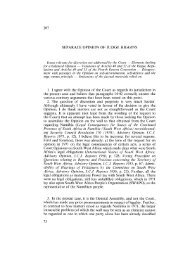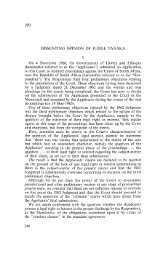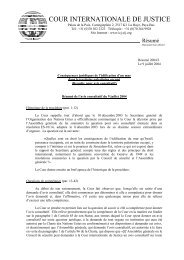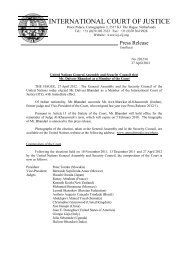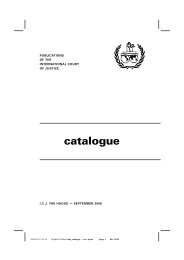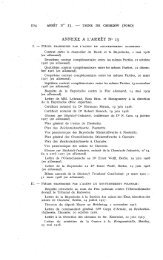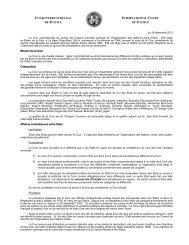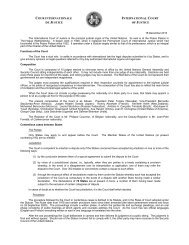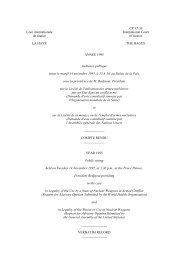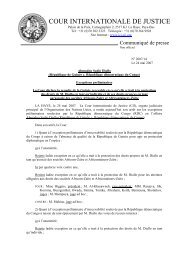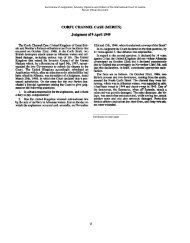botswana/namibia - Cour international de Justice
botswana/namibia - Cour international de Justice
botswana/namibia - Cour international de Justice
Create successful ePaper yourself
Turn your PDF publications into a flip-book with our unique Google optimized e-Paper software.
- From the time of Botswana's in<strong>de</strong>pen<strong>de</strong>nce in 1966 until the Pretoria Agreement of 1984,<br />
there was no evi<strong>de</strong>nce of any acquiescence on the part of Botswana.<br />
(G) Evi<strong>de</strong>nce of South African Acquiescence in the Period 1960 to 1992<br />
784. As the Government of Botswana has already explained in Chapter 1 of this pleading,<br />
from 1960 onward all cultivation on the island was prohibited by the authorities of the<br />
Bechuanaland Protectorate and, subsequently, of Botswana: see above, Chapter 1, paras. 58-<br />
64. According to the Namibian Memorial, the South African Government exercised authority<br />
over the island at this period and such authority had been inherited from the German period.<br />
785. In fact, no representation on the issue was ma<strong>de</strong> by the authorities in South-West-Africa<br />
until March 1992. This silence is particularly significant because, according to the Namibian<br />
case, cultivation by the people of the Caprivi was the form the alleged exercise of authority by<br />
South Africa and its pre<strong>de</strong>cessor assumed. Moreover, according to the Namibian<br />
Government's view of the facts, the island was regularly used for cultivation by people from<br />
Kasika and any disruption of this pattern should have provoked an immediate response.<br />
786. The evi<strong>de</strong>nce thus shows an acceptance by South Africa of the title of Botswana (and its<br />
pre<strong>de</strong>cessor) over a period of thirty-two years, from 1960 until 1992. This evi<strong>de</strong>nce is<br />
reinforced by the failure of South Africa to protest official maps of Botswana showing the<br />
boundary in the northern channel in the period after in<strong>de</strong>pen<strong>de</strong>nce.<br />
(H) Conclusion: There is no evi<strong>de</strong>nce to support the alleged Title of Namibia on the<br />
Basis of Prescription or Acquiescence<br />
787. There is no evi<strong>de</strong>nce to support the alleged title of Namibia on the basis of prescription<br />
or acquiescence. However, there is a preliminary obstacle to this basis of title, in that it is<br />
contrary to principle to accept an adverse possession based upon the subversion of a recently<br />
conclu<strong>de</strong>d boundary treaty. In any event, there is no evi<strong>de</strong>nce that German officials had an<br />
intention to rely upon any acts of possession not based upon the Anglo-German Agreement,<br />
and, in accordance with the principle of good faith, the presumption must be that no such<br />
intention existed.<br />
788. In so far as the conditions for the existence of title by prescription are concerned, the<br />
Namibian Government <strong>de</strong>als with the requirement of a continuous and peaceful exercise of<br />
State authority by the frequent reiteration of the assertion that the agricultural activities on the<br />
island of Basubia from Kasika were capable of generating title. This view was first expressed<br />
by the South African administrator, Trollope, in 1948. It was not a view held by the British<br />
Government at any stage.<br />
789. Far from any prescription having occurred, the first tentative formulation of a South<br />
African claim was in a South African letter dated 14 February 1949 (Botswana Memorial,<br />
Annex 25). Prior to this date there had been no dispute and, when the correspon<strong>de</strong>nce of the<br />
period 1948 to 1951 <strong>de</strong>veloped, it was the South African Government which was seeking to<br />
modify the legal status quo, and the contemporary documents show that the South Africa<br />
officials were aware of this.<br />
790. In relation to the period from 1951 until 1992 the Namibian case appears even more<br />
threadbare. In 1951 British officials had affirmed the title based upon the Anglo-German



